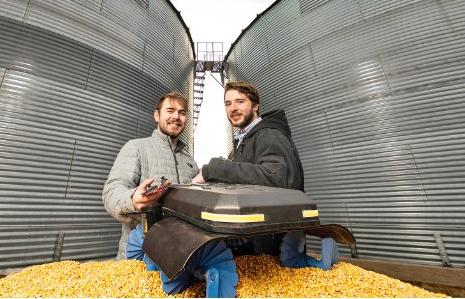Local innovators report progress in taking product to mkt
A Grain Weevil concept designed to improve grain bin safety is slowly but surely gaining traction and credibility as father and son co-founders Chad and Ben Johnson report significant progress in developing the foundation and funding needed to take their product to market nationwide.
First introduced to area farmers in 2020, the Grain Weevil has evolved in look, design and functionality, based on feedback and exhaustive testing, much of that performed in grain bins right here in Hamilton County. Having just returned from several days of testing in Tennessee, Chad Johnson reported Friday that the company is making exciting progress on several fronts.
“We’re been doing a lot of on-the-farm trials collecting several hundred hours of operational data and that’s helping us build out the final product,” Johnson reported. “We’ve got five farms in Tennessee, Iowa and Nebraska that we’re doing these trials on and that’s a big part of working with The Combine.”
Based in Lincoln, The Combine is an incubator program designed to assist entrepreneurs with initial goal setting and idea assessment in preparation for raising capital. (See related article)
“They’ve been a huge help for us and we’ve also helped them in the process of developing a farmer network,” Johnson noted. “With their help we have been able to take on venture capital, so that was a big piece of our process this fall. That is what is going to help us accelerate our development and our growth.”
Having recently secured approximately $1.6 million in venture capital, mostly from Nebraska investors, Grain Weevil as a company has grown to include four full-time employees with operational funding in the bank to cover the next 18-24 months. Co-founder Ben Johnson serves as chief innovation officer, having completed his electrical engineering degree at the University of Nebraska-Omaha. He and Zane Zents, a fellow UNO grad who works as an embedded software engineer, work in an Omaha office. Chad Johnson, as chief executive officer, recently joined the company full time, stepping away from his role at the Nebraska Public Power District, with Jeremy Heeg of Aurora also recently joining the team.
“This was a big step for me,” Johnson said of his decision to work full-time for the Grain Weevil. “I’ve been at NPPD for 14 years now and I remember the very first meeting we had they asked about my growth plan, what I would like to do, and what my dream job would be. I told them I’d never leave NPPD unless I was building robots with my kids. That was 14 years ago, so it’s come full circle.”
Johnson and Heeg have an office at the Aurora Technology Center on H Street, though much of their work is conducted in a shop at Johnson’s home.
Expanding vision
From Day 1 the Grain Weevil’s focus has been on creating a grain bin safety and management robot that directly engages the surface of the grain, breaking crusts, doing inspections and feeding grain into extraction augers. The goal has always been to eliminate the need for farmers to perform that sometimes dangerous task, though Johnson explained that in recent months the vision has begun to grow.
“The biggest change is we are really focused beyond the farm piece,” he said. “There are some hurdles with on the farm and commercial facilities with being intrinsically safe, so we’ve got to make sure that before we can sell the robot to an individual consumer it has to pass safety certifications. That’s not an easy process, so actually what we’re looking at now, which is kind of a cool opportunity, is specialty crops.”
Deploying the Grain Weevil in a typical Nebraska bin involves grain dust, which creates a certain level of hazardous conditions, Johnson explained in more detail. Some speciality crops, including edible beans and nuts like pistachios and hazelnuts, don’t create dust and therefore represent a whole new market opportunity.
“We’re actually going out to western Nebraska in two weeks to test on edible beans to see if we can break up the crust that forms and those kind of things,” he said. “We know it can, it’s just a matter of demonstrating that to them, so that gives us an opportunity to start providing some services because they don’t have the same dust explosion requirements that we have in grain bins.
“Then we also have some speciality crops like pistachios and hazelnuts in California and Oregon that are wanting to do some initial testing as well,” he continued. “That’s kind of low-hanging fruit for us because it’s not dust explosion environments, so it’s a little easier to get to that stage. Actually, that helps us accelerate our development toward our ultimate goal, which is still the local farmer grain bins.”
Expanding more on the company’s exploration into speciality crop markets, Johnson explained their involvement with an accelerator program in Memphis called Ag Launch, which as the name implies involves start-up companies working specifically in agriculture.
“We went through their program and part of that includes these farm trials,” he said. “We have two farmers in Tennessee who participated in this program, where the farmer buys a product from us now, knowing that it’s not ready yet, and the state reimburses them for the process. That helps us develop the product and then when we’re all done they’ll end up with the robots on their farm. It’s a really cool opportunity for us to expand our network.”
Having spent a lot of time in Nebraska grain bins, especially those on the Zach and Brandon Hunnicutt farms near Giltner, Johnson and the Grain Weevil team have learned that farm processes involving other crops are vastly different.
“We recently got to drive on rice for the first time and rice is an extremely interesting challenge for farmers because when you put it in a grain bin it doesn’t flow,” he said. “You get steep walls and just big pillars, piles of rice, so it was a fun experience to learn more about that. It definitely just expands our opportunity to work.”
Patents pending
In addition to the testing in grain bins and shop work, Johnson said the company is moving the needle on the lengthy process of attaining patents to protect various intellectual property aspects of their robot.
“We have two patents that have been applied for and three or four more are in the works,” he reported. “They are all in different phases in that government process.”
As for when the Grain Weevil might be available for sale to Nebraska farmers, that too remains a work in progress.





